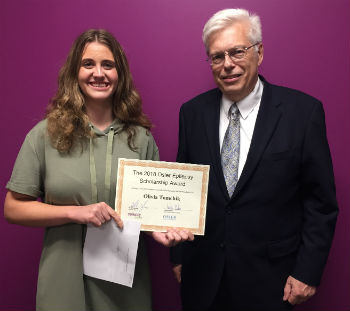By Deron Hamel
If you are living with epilepsy, the condition should not define the person you are, says Olivia Tomchick. To persevere in life, you need to kick your fears to the curb and pursue your dreams, says the 19-year-old.
With this idea in mind, Olivia keeps pursuing her interests and doing the things she enjoys. She cites former U.S. Olympic hockey team goalie Chanda Gunn as an inspiration. Like Olivia, Gunn is living with epilepsy.

Olivia, who hails from St. Thomas, Ont., was diagnosed with epilepsy in 2011, when she was 12. Since her diagnosis, life has been challenging at times, she says. Her condition has impacted the social, active and academic aspects of her life, she says.
An avid soccer player, Olivia recalls how her coaches, aware of her condition, would often cut down her playing time over concern for her well-being. They would constantly ask her if she “was OK.” All Olivia needed, she says, was a little reassurance.
“I understand they were worried about me, and they want me to be safe, but it was extremely annoying to constantly be asked if I was OK,” she says. “In a sense, it kind of discouraged me to play, since all they would ever do is doubt me and my ability to know my own body.”
While reading about Gunn’s career in sports, Olivia discovered that the goalie worked with the same type of over-protective coaches she had.
“It was easier to cope knowing that the same scenario that I was going through was also a struggle for an Olympic athlete,” she says.
As Olivia pursues her post-secondary education, the lessons she has learned on her own and through the example of others will continue to guide her in life, she says.
“(J)ust because you suffer epilepsy doesn’t mean that you should let that stop you from trying to pursue something you’re passionate about or let anything stand in the way of the happiness you truly deserve,” she says.
Olivia is one of the recipients of this year’s Osler Epilepsy Scholarship. The $1,500 scholarship, formerly called the OBCL Epilepsy Scholarship, is being offered to five students this year.
Osler Epilepsy Scholarships are awarded each year to exceptional students who have confronted and overcome remarkable barriers in their academic and personal lives due to their epilepsy.
Applicants also submit a 600- to 900-word essay, about a famous person who has epilepsy and what that person’s life means to them.






